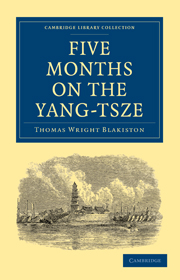 Five Months on the Yang-Tsze
Five Months on the Yang-Tsze Book contents
- Frontmatter
- PREFACE
- Contents
- LIST OF ILLUSTRATIONS
- CHAPTER I UP TO NANKING
- CHAPTER II THE MING TOMBS
- CHAPTER III THE TAIPINGS AT THEIR CAPITAL
- CHAPTER IV A NAVAL SQUADRON INLAND
- CHAPTER V ADMIRAL HOPE'S EXPLORATION
- CHAPTER VI JUNK TRAVELLING IN HOO-PEH
- CHAPTER VII SHI-SHOW TO I-CHANG
- CHAPTER VIII GORGES AND RAPIDS
- CHAPTER IX EASTERN SZ'CHUAN
- CHAPTER X VISITS AND CEREMONIES
- CHAPTER XI THE GOLD-SAND RIVER
- CHAPTER XII CROSS RANGES
- CHAPTER XIII CHUNG-KING
- CHAPTER XIV THE FOUR VALLEYS
- CHAPTER XV SÜ-CHOW AND THE WESTERN REBELS
- CHAPTER XVI PING-SHAN — OUR FARTHEST
- CHAPTER XVII THE UPPER YANG-TSZE
- CHAPTER XVIII DOWN THE KIN-CHA KIANG
- CHAPTER XIX RETURN FROM THE INTERIOR
- APPENDIX
CHAPTER III - THE TAIPINGS AT THEIR CAPITAL
Published online by Cambridge University Press: 28 April 2011
- Frontmatter
- PREFACE
- Contents
- LIST OF ILLUSTRATIONS
- CHAPTER I UP TO NANKING
- CHAPTER II THE MING TOMBS
- CHAPTER III THE TAIPINGS AT THEIR CAPITAL
- CHAPTER IV A NAVAL SQUADRON INLAND
- CHAPTER V ADMIRAL HOPE'S EXPLORATION
- CHAPTER VI JUNK TRAVELLING IN HOO-PEH
- CHAPTER VII SHI-SHOW TO I-CHANG
- CHAPTER VIII GORGES AND RAPIDS
- CHAPTER IX EASTERN SZ'CHUAN
- CHAPTER X VISITS AND CEREMONIES
- CHAPTER XI THE GOLD-SAND RIVER
- CHAPTER XII CROSS RANGES
- CHAPTER XIII CHUNG-KING
- CHAPTER XIV THE FOUR VALLEYS
- CHAPTER XV SÜ-CHOW AND THE WESTERN REBELS
- CHAPTER XVI PING-SHAN — OUR FARTHEST
- CHAPTER XVII THE UPPER YANG-TSZE
- CHAPTER XVIII DOWN THE KIN-CHA KIANG
- CHAPTER XIX RETURN FROM THE INTERIOR
- APPENDIX
Summary
In continuing Mr. Forrest's account, I should state that the matter of this chapter was originally published in the ‘North China Herald,’ in two papers, entitled ‘Nanking and the Inhabitants thereof,’ and ‘The Taipings at Home.’ My friend has so vividly portrayed what few have had the same opportunities of seeing, and none have so well described, that I make no apology for transferring his observations to these pages almost in full. As I do not pretend to give a history of the Taiping revolutionary movement, I will only preface this chapter by remarking that the Taiping (Peace) rebellion originated about 1850 in the southern province of Kwang-si. The founders belonged to a religious sect called God-worshippers, who in the autumn of that year came into collision with the authorities, and immediately started as regenerators of the empire; and there is reason to believe that they were sincere, and their motives pure—Christianity being their profession, but mixed with a good deal of error. Yung-an was the first city they captured; it remained in their hands from the 27th August, 1851, till the 7th April, 1852, when they left it and marched through the country in a united band, carrying all before them, ravaging and destroying many of the finest cities of Hoo-nan; and thence descending the Yang-tsze Kiang, visiting Hankow and other cities on its banks, they ultimately took possession of Nanking on the 19th March, 1853, where they established their head-quarters.
- Type
- Chapter
- Information
- Five Months on the Yang-TszeWith a Narrative of the Exploration of its Upper Waters and Notices of the Present Rebellions in China, pp. 31 - 55Publisher: Cambridge University PressPrint publication year: 2010First published in: 1862


